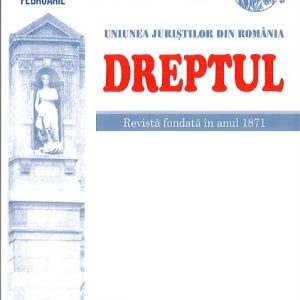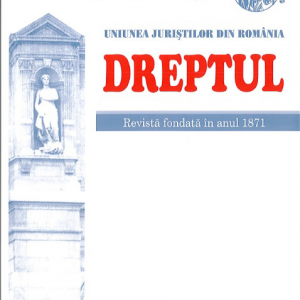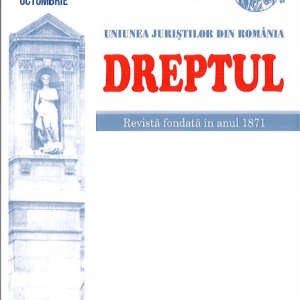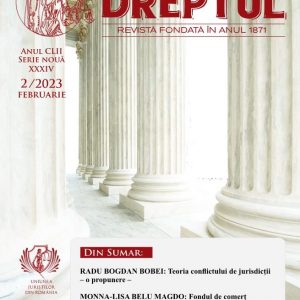-
 The article proposes procedural solutions, in compliance with the requirements of the ECHR practice, when changing the legal classification given to the deed, in appeal, by appreciating that the change in the legal classification given to the deed by the act of referral can be made by an undeniable conclusion, prior to the debate on the appeal, or by the conclusion for reinstating the case on the list of cases, provided that the court has debated the appeal, pending further ruling also for the reason concerning the change in the legal classification, which it found to be well-grounded.
The article proposes procedural solutions, in compliance with the requirements of the ECHR practice, when changing the legal classification given to the deed, in appeal, by appreciating that the change in the legal classification given to the deed by the act of referral can be made by an undeniable conclusion, prior to the debate on the appeal, or by the conclusion for reinstating the case on the list of cases, provided that the court has debated the appeal, pending further ruling also for the reason concerning the change in the legal classification, which it found to be well-grounded. -
 Potrivit art. 320 C.pr.pen., dacã pânã la începerea cercetãrii judecãtorești inculpatul declarã personal sau prin înscris autentic cã recunoaște sãvârșirea faptelor reținute în actul de sesizare a instanței și solicitã ca judecata sã se facã în baza probelor administrate în faza de urmãrire penalã, instanța va pronunța condamnarea inculpatului, care beneficiazã de reducerea cu o treime a limitelor de pedeapsã prevãzute de lege, în cazul pedepsei închisorii…
Potrivit art. 320 C.pr.pen., dacã pânã la începerea cercetãrii judecãtorești inculpatul declarã personal sau prin înscris autentic cã recunoaște sãvârșirea faptelor reținute în actul de sesizare a instanței și solicitã ca judecata sã se facã în baza probelor administrate în faza de urmãrire penalã, instanța va pronunța condamnarea inculpatului, care beneficiazã de reducerea cu o treime a limitelor de pedeapsã prevãzute de lege, în cazul pedepsei închisorii… -
 The present study aims at analyzing the new legal provisions regarding the country’s minimum gross salary guaranteed in payment. Recently, through a series of normative acts, the legislator renounced the old approach to the regulation of the minimum gross national salary guaranteed in payment, setting minimum differentiated salaries for certain categories of employees. Thus, employees with higher education and those with a minimum length of work will have a higher level of salary compared to the minimum gross salary guaranteed in payment. Moreover, the legislator set a higher threshold for the minimum wage in the construction sector, which benefits the employees of this sector of activity. This change of optics requires an analysis of its legality and timeliness. In order to outline the conclusions, there will be analyzed the internal sources, the provisions of ILO Convention No 131/1970 concerning Minimum wage fixing, with special reference to developing countries, and similar provisions in the field of minimum wage in different states.
The present study aims at analyzing the new legal provisions regarding the country’s minimum gross salary guaranteed in payment. Recently, through a series of normative acts, the legislator renounced the old approach to the regulation of the minimum gross national salary guaranteed in payment, setting minimum differentiated salaries for certain categories of employees. Thus, employees with higher education and those with a minimum length of work will have a higher level of salary compared to the minimum gross salary guaranteed in payment. Moreover, the legislator set a higher threshold for the minimum wage in the construction sector, which benefits the employees of this sector of activity. This change of optics requires an analysis of its legality and timeliness. In order to outline the conclusions, there will be analyzed the internal sources, the provisions of ILO Convention No 131/1970 concerning Minimum wage fixing, with special reference to developing countries, and similar provisions in the field of minimum wage in different states. -
 The author examines synthetically the changes brought to the institutional structure of the European Union by the Treaty of Lisbon. For this purpose, the author presents the essential institutional changes brought to: the European Parliament; the European Council; the Council; the European Commission (the Commission); the Court of Justice of the European Union.
The author examines synthetically the changes brought to the institutional structure of the European Union by the Treaty of Lisbon. For this purpose, the author presents the essential institutional changes brought to: the European Parliament; the European Council; the Council; the European Commission (the Commission); the Court of Justice of the European Union. -
 In respect of the contract of transport, the provisions of the new Romanian Civil Code in the matter (Articles 1955–2008) have the nature of general law, which, as the case may be, is supplemented by the special legislation, specific to each type of transport (rail, naval, road, air). Considering the above, this study makes an analysis of the provisions of the new Civil Code referring to a limited aspect, namely a summary on the rules of this Code, with reference to the civil-contractual liability of the transporter in the contract of transport of goods.
In respect of the contract of transport, the provisions of the new Romanian Civil Code in the matter (Articles 1955–2008) have the nature of general law, which, as the case may be, is supplemented by the special legislation, specific to each type of transport (rail, naval, road, air). Considering the above, this study makes an analysis of the provisions of the new Civil Code referring to a limited aspect, namely a summary on the rules of this Code, with reference to the civil-contractual liability of the transporter in the contract of transport of goods. -
 Întrebarea pe care ne-o punem cu toții este cum să construim o societate a bunăstării, în care să domnească cel puțin o bună înțelegere și toleranța, o societate non-agresivă, dacă o societate consensuală nu este posibilă. Răspunsul ar putea fi preferința pentru dialog; deci este necesară crearea de instituții și proceduri care prin mijloace juridice să asigure consolidarea democrației. Revizuirea Constituției este o importantă pârghie pentru a se atinge acest scop. Buna guvernare și consolidarea statului de drept se pot obține prin amplificarea rolului dreptului în sistemul politic statal, astfel încât democrația și o participare publică reală la formularea și adoptarea actelor normative secundare și chiar terțiare să fie consacrate prin norme juridice constituționale.
Întrebarea pe care ne-o punem cu toții este cum să construim o societate a bunăstării, în care să domnească cel puțin o bună înțelegere și toleranța, o societate non-agresivă, dacă o societate consensuală nu este posibilă. Răspunsul ar putea fi preferința pentru dialog; deci este necesară crearea de instituții și proceduri care prin mijloace juridice să asigure consolidarea democrației. Revizuirea Constituției este o importantă pârghie pentru a se atinge acest scop. Buna guvernare și consolidarea statului de drept se pot obține prin amplificarea rolului dreptului în sistemul politic statal, astfel încât democrația și o participare publică reală la formularea și adoptarea actelor normative secundare și chiar terțiare să fie consacrate prin norme juridice constituționale. -
 In this study, the author provides a critical analysis of the content of art. 2322 of the Civil Code that has entered into force on 1 October 2011, regulating for the first time, in terms of legislation, autonomous guarantee instrument of the letter of comfort. Given the lack of doctrinal explanations and of the Romanian jurisprudence in this regard, the author makes a comparative law analysis regarding the use of this instrument, employing as reference points the Common Law systems and Continental Law systems based on the existence of a Civil Code. This instrument is known since the early 1960s by the international transactions practice, but the corresponding case law is quite limited and in some legislation, although frequently used, letters of comfort are not subject to an expressis verbis legislative regulation. The author emphasizes the Romanian Civil Code modern nature together with the call for a consistent use, in practice, of this legal institution.
In this study, the author provides a critical analysis of the content of art. 2322 of the Civil Code that has entered into force on 1 October 2011, regulating for the first time, in terms of legislation, autonomous guarantee instrument of the letter of comfort. Given the lack of doctrinal explanations and of the Romanian jurisprudence in this regard, the author makes a comparative law analysis regarding the use of this instrument, employing as reference points the Common Law systems and Continental Law systems based on the existence of a Civil Code. This instrument is known since the early 1960s by the international transactions practice, but the corresponding case law is quite limited and in some legislation, although frequently used, letters of comfort are not subject to an expressis verbis legislative regulation. The author emphasizes the Romanian Civil Code modern nature together with the call for a consistent use, in practice, of this legal institution. -
 In this paper, the author analyzes the functional competence of the hierarchically superior prosecutor to carry out criminal prosecution acts in criminal files investigated by the criminal investigation bodies whose supervision is exercised by the prosecutor within the prosecutor’s office. For this purpose, a first starting point is the Criminal Procedure Code, which regulates the judicial function of criminal prosecution in criminal trial, respectively the competence of the prosecutor in performing this function, but references are also made to the Internal Regulation of the prosecutor’s offices of 14 November 2019, to the case law of the Constitutional Court of Romania in the matter, but also to the principle of the hierarchical control that governs the activity within the Public Ministry, principle with constitutional rank, regulated by the provisions of Articles 131–132 of the Constitution. The conclusion reached after presenting a pertinent argumentation is that the hierarchically superior prosecutor does not have the functional competence to lead and supervise the activity of the criminal investigation bodies, which is carried out within the criminal files assigned to the subordinated prosecutors, considering his quality of chief prosecutor.
In this paper, the author analyzes the functional competence of the hierarchically superior prosecutor to carry out criminal prosecution acts in criminal files investigated by the criminal investigation bodies whose supervision is exercised by the prosecutor within the prosecutor’s office. For this purpose, a first starting point is the Criminal Procedure Code, which regulates the judicial function of criminal prosecution in criminal trial, respectively the competence of the prosecutor in performing this function, but references are also made to the Internal Regulation of the prosecutor’s offices of 14 November 2019, to the case law of the Constitutional Court of Romania in the matter, but also to the principle of the hierarchical control that governs the activity within the Public Ministry, principle with constitutional rank, regulated by the provisions of Articles 131–132 of the Constitution. The conclusion reached after presenting a pertinent argumentation is that the hierarchically superior prosecutor does not have the functional competence to lead and supervise the activity of the criminal investigation bodies, which is carried out within the criminal files assigned to the subordinated prosecutors, considering his quality of chief prosecutor. -
 The provisions of Article 320 of the Law No 95/2006 on health reform have raised serious problems of interpretation in judicial practice. The question has therefore been raised as to whether persons who have suffered physical injury may be required to pay their hospital costs of hospitalization and medical treatment in the healthcare facilities concerned, where the author of the injury has not been identified or the injured party does not disclose his identity, or where he is simply not liable for criminal action. The question was also raised as to whether the injured party had failed to make or withdraw his plea or had the parties reconciled or not committed the offense claimed.
The provisions of Article 320 of the Law No 95/2006 on health reform have raised serious problems of interpretation in judicial practice. The question has therefore been raised as to whether persons who have suffered physical injury may be required to pay their hospital costs of hospitalization and medical treatment in the healthcare facilities concerned, where the author of the injury has not been identified or the injured party does not disclose his identity, or where he is simply not liable for criminal action. The question was also raised as to whether the injured party had failed to make or withdraw his plea or had the parties reconciled or not committed the offense claimed. -

-
 Democrația ca formă de organizare și de conducere a societății trebuie să se adapteze la noile realități impuse de tehnologia digitală, mai ales printr-un anumit tip de revoluție educativă și culturală în serviciul utilizatorilor. Așadar, democrația în epoca digitală presupune, în primul rând, recunoașterea unui drept fundamental de acces la spațiul digital pentru a se evita în acest mod riscurile unei rupturi digitale, în sensul utilizării acestuia de un număr restrâns de oameni – o elită cibernetică –, implicând toate avantajele ce ar rezulta pentru aceasta din folosirea rețelelor de informare și de comunicare, cum ar fi, de pildă, internetul. Prin urmare, beneficiile unei societăți cibernetice nu sunt reale decât dacă instrumentele informatice sunt pe larg difuzate și puse la dispoziția unui număr cât mai mare de indivizi umani. Într-adevăr, o e-democrație sau o e-administrație nu vor fi inovații relevante decât dacă un număr foarte mare de cetățeni va avea acces facil la acestea.
Democrația ca formă de organizare și de conducere a societății trebuie să se adapteze la noile realități impuse de tehnologia digitală, mai ales printr-un anumit tip de revoluție educativă și culturală în serviciul utilizatorilor. Așadar, democrația în epoca digitală presupune, în primul rând, recunoașterea unui drept fundamental de acces la spațiul digital pentru a se evita în acest mod riscurile unei rupturi digitale, în sensul utilizării acestuia de un număr restrâns de oameni – o elită cibernetică –, implicând toate avantajele ce ar rezulta pentru aceasta din folosirea rețelelor de informare și de comunicare, cum ar fi, de pildă, internetul. Prin urmare, beneficiile unei societăți cibernetice nu sunt reale decât dacă instrumentele informatice sunt pe larg difuzate și puse la dispoziția unui număr cât mai mare de indivizi umani. Într-adevăr, o e-democrație sau o e-administrație nu vor fi inovații relevante decât dacă un număr foarte mare de cetățeni va avea acces facil la acestea. -
 The change of vision brought by the new Civil Code in re ation to the partition contract requires an examination more attuned to the practical aspect. This study shows that, due to the fiscal taxation and the problem of the community regime of spouses, it shouldn’t be indifferent to us the translative effect of the partition contract. The transition from the declarative effect has clearly intended to provide a more coherent system in regard to certain issues like the fate of deeds closed by a co-owner over the whole property as well as the guarantee for eviction and defects. However, we tried to state that the retroactivity of the declarative system provided as well palpable benefits for the person seeking to enter into a partition by mutual agreement. Also, in the final part of this study we provided some details regarding the conditions for registration in the land book of the legal hypothecation stipuled for the previous co-owner regarding the debt from eviction.
The change of vision brought by the new Civil Code in re ation to the partition contract requires an examination more attuned to the practical aspect. This study shows that, due to the fiscal taxation and the problem of the community regime of spouses, it shouldn’t be indifferent to us the translative effect of the partition contract. The transition from the declarative effect has clearly intended to provide a more coherent system in regard to certain issues like the fate of deeds closed by a co-owner over the whole property as well as the guarantee for eviction and defects. However, we tried to state that the retroactivity of the declarative system provided as well palpable benefits for the person seeking to enter into a partition by mutual agreement. Also, in the final part of this study we provided some details regarding the conditions for registration in the land book of the legal hypothecation stipuled for the previous co-owner regarding the debt from eviction.
